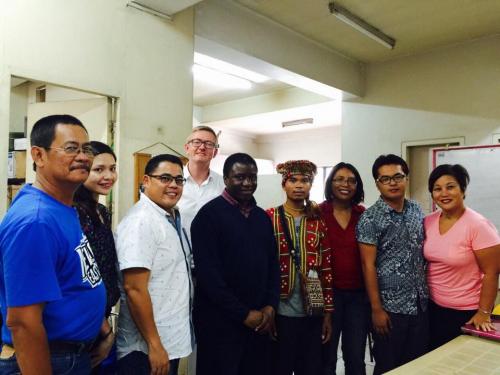"We want international bodies to know what is happening in Mindanao—that the Lumad, in defense of their land, are being killed and forced to leave their communities," Karapatan secretary general Cristina Palabay said.

Karapatan brought to the attention of the United Nations Human Rights Council the killing of Lumad leaders Dionel Campos and Datu Juvello Sinzo, and ALCADEV school director Emerito Samarca. Karapatan asked for an investigation on the killings and the evacuation of almost 3,000 Lumad in Surigao del Sur through letters* sent to Dr. Chaloka Beyani, SR on the Promotion of the Human Rights of Internally Displaced Persons; Christof Heyns, Special Rapporteur (SR) on extrajudicial, summary or arbitrary executions; Michel Forst, SR on Situation of Human Rights Defenders; and Victoria Lucia Tauli-Corpuz, SR on Rights of the Indigenous People’s. "We are asking the UN HRC to investigate and recommend actions to the Philippine Government on these issues," Palabay added.
"We want international bodies to know what is happening in Mindanao—that the Lumad, in defense of their land, are being killed and forced to leave their communities," Karapatan secretary general Cristina Palabay said.

Karapatan brought to the attention of the United Nations Human Rights Council the killing of Lumad leaders Dionel Campos and Datu Juvello Sinzo, and ALCADEV school director Emerito Samarca. Karapatan asked for an investigation on the killings and the evacuation of almost 3,000 Lumad in Surigao del Sur through letters* sent to Dr. Chaloka Beyani, SR on the Promotion of the Human Rights of Internally Displaced Persons; Christof Heyns, Special Rapporteur (SR) on extrajudicial, summary or arbitrary executions; Michel Forst, SR on Situation of Human Rights Defenders; and Victoria Lucia Tauli-Corpuz, SR on Rights of the Indigenous People’s. "We are asking the UN HRC to investigate and recommend actions to the Philippine Government on these issues," Palabay added.
It was the morning of September 1, 2015, when the Magahat/Bagani paramilitary forces under the 36th and 75th Infantry Battalion-Philippine Army gunned down Campos in front of the whole community in Km. 16, Diatago, Lianga, Surigao del Sur. Sinzo, who was separated from the crowd, was tortured by hitting his arms and legs with wooden stick before he was shot. Samarca, on the other hand, was found dead inside the classroom of ALCADEV with an ear-to-ear slit on the throat and gunshot wounds in the chest. "The 36th Infantry Battalion (IB), 74th IB and the Special Forces were at the periphery," Palabay recounted the accounts of the witnesses.
"While the AFP can lie through their teeth about their involvement on the killings and all other atrocities of its paramilitary groups, the motives are crystal clear: eliminate those who are perceived as enemies of the state, including those who fight for their land and their rights. There is no way the government can deny this as long as it implements counter-insurgency programs like Oplan Bayanihan. The paramilitary groups is one way of tackling this dirty war against the Filipino people. It is no wonder why the AFP has not disbanded these groups—because they work together," Palabay said.
The killing of Fr. Fausto Tentorio, the massacre of the Capion family, the murder of Datu Jimmy Liguyon, the Tabugol brothers, among others was done through the use of paramilitary forces who are known in many names—the Civilian Auxiliary Forces Geographical Unit (CAFGU), the Special Civilian Armed Auxilliary, the Investment Defense Force, Bagani Forces, Magahat-Bagani, Alde Salusad’s group, and the De la Mance group, to name a few.
Back in 2012, Heyns and then UN SR on human rights defenders Margaret Sekaggya have already sounded the alarm bells on the role of the paramilitary groups in the killings. Their statement can be viewed through this link: http://www.ohchr.org/en/NewsEvents/Pages/DisplayNews.aspx?NewsID=12333&LangID=E
In
the same year, during the UN’s Universal Periodic Review (UPR) on the Philippines there were already recommendations from member Nations to disband paramilitary groups that perpetuate serious abuses. "The BS Aquino government has rejected this and even continued to multiply and allowed the proliferation of these groups as force multipliers. We reiterate our position that the political killings happening right now is part of the government’s policy and not simply an internal conflict among indigenous people’s as the government wants the public to believe,” Palabay ended.
*Copies of the complaints are available upon request.
